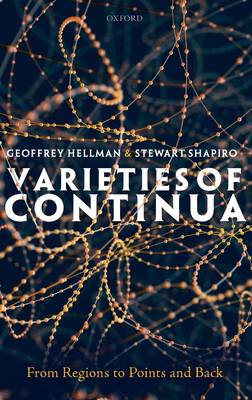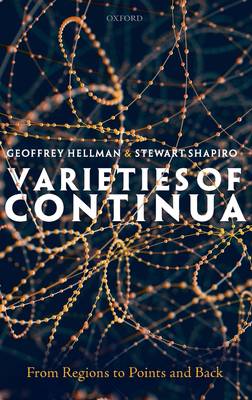
- Afhalen na 1 uur in een winkel met voorraad
- Gratis thuislevering in België vanaf € 30
- Ruim aanbod met 7 miljoen producten
- Afhalen na 1 uur in een winkel met voorraad
- Gratis thuislevering in België vanaf € 30
- Ruim aanbod met 7 miljoen producten
Zoeken
Varieties of Continua
From Regions to Points and Back
Geoffrey Hellman, Stewart Shapiro
Hardcover | Engels
€ 153,45
+ 306 punten
Omschrijving
Varieties of Continua explores the development of the idea of the continuous. Hellman and Shapiro begin with two historical episodes. The first is the remarkably rapid transition in the course of the nineteenth century from the ancient Aristotelian view, that a true continuum cannot be composed of points, to the now standard, point-based frameworks for analysis and geometry found in modern mainstream mathematics (stemming from the work of Bolzano, Cauchy, Weierstrass, Dedekind, Cantor, et al.). The second is the mid-tolate-twentieth century revival of pre-limit methods in analysis and geometry using infinitesimals including non-standard analysis (due to Abraham Robinson), and the more radical smooth infinitesimal analysis that uses intuitionistic logic. Hellman and Shapiro present a systematic comparison of these and related alternatives (including constructivist and predicative conceptions), weighing various trade-offs, helping articulate a modern pluralist perspective, and articulate a modern pluralist perspective on continuity. The main creative work of the book is the development of rigorous regions-based theories of classical continua, including Euclidean and non-Euclidean geometries, that are mathematically equivalent (inter-reducible) to the currently standard, point-based accounts in mainstream mathematics.
Specificaties
Betrokkenen
- Auteur(s):
- Uitgeverij:
Inhoud
- Aantal bladzijden:
- 220
- Taal:
- Engels
Eigenschappen
- Productcode (EAN):
- 9780198712749
- Verschijningsdatum:
- 15/04/2018
- Uitvoering:
- Hardcover
- Formaat:
- Genaaid
- Afmetingen:
- 155 mm x 236 mm
- Gewicht:
- 453 g

Alleen bij Standaard Boekhandel
+ 306 punten op je klantenkaart van Standaard Boekhandel
Beoordelingen
We publiceren alleen reviews die voldoen aan de voorwaarden voor reviews. Bekijk onze voorwaarden voor reviews.












